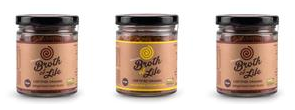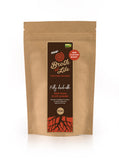Understanding REAL Organic Ingredients
At Broth of Life we are committed to using the freshest local fully certified organic ingredients available. But many are confused by "organic" vs "certified organic".
Is Certified Organic the same as Organic?
No. The word "organic" can be used on a label by anyone. I can buy onions for example from Coles that cost $1kg and use the word organic, even thought they aren't. OR I may be more ethical and purchase certified organic chicken frames for chicken broth and then call my broth organic... but it isn't.
Certified Organic products go through a rigorous independent audit to ensure not only are ALL ingredients fully certified organic and the processing facility/kitchen is ALSO fully organic. Think cleaning materials, dishwashing liquid, storage facilities, cold rooms, packaging.. the list is quite extensive.
There is no cheating for the business financially or ethically.
How Are We Eco Friendly
Part of being certified organic is to ensure sustainability. We operate with the largest solar system allowed by the state government, have implemented multiple energy saving devices. We use filtered rain water and have worked hard to ensure the removal of all plastic packaging and waste from our operations, and are now proud members of Plastic Free Coolum.
We have zero waste as all vegetable scraps are given to chickens or used in compost and our cooked bones are donated to blood and bone fertiliser. Some would even say taking bones for bone broth is the use of a "waste" ingredient. This is a circular economy at it's best.
Addressing Misconceptions About The Organic Industry
Many believe that organic foods are just a marketing gimmick. It is far from that. Organic farming strictly limits the use of synthetic pesticides and fertilisers, promoting ecological balance and biodiversity. It often results in better soil health and reduces pollutants in our waterway, soil and air. Moreover, it can yield produce that is richer in nutrients, including antioxidants. By choosing organic, consumers not only support their health but also contribute to a more sustainable farming future.
Slow Simmering: A Time Tested Method
With modern technology and pressure cookers, bone broth can be produced in a short time, or it can be processed into a paste. However, this is not natural and not the way ancient bone broth was made. The slow simmering for over 24 hours allows for the extraction of collagen, amino acids, and minerals from the bones into the broth, making it a nutrient-dense food. Our ancestors dried the broth in animal skins on hot stones so they could take it with them. Today, we continue this tradition, recognising bone broth as a wholesome, deeply nourishing food where the ancient slow process should not be tampered with.
Support Sustainable Practices
Broth of Life is proud to honour a slow cooking process, using fully certified organic ingredients from sustainable farming practices, despite the higher cost in ingredients and utilities to do so.
By supporting a business that prioritises our environment and has a core focus on eco-friendly practices, you can help reduce environmental damage and promote healthier manufacturing processes.
BUY DEHYDRATED BONE BROTH

BUY FREEZE DRIED BONE BROTH POWDER





